-
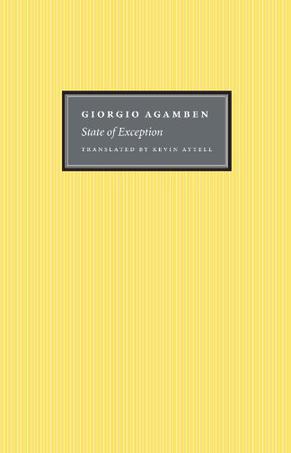
State of Exception
Two months after the attacks of 9/11, the Bush administration, in the midst of what it perceived to be a state of emergency, authorized the indefinite detention of noncitizens suspected of terrorist activities and their subsequent trials by a military commission. Here, distinguished Italian philosopher Giorgio Agamben uses such circumstances to argue that this unusual extension of power, or "state of exception," has historically been an underexamined and powerful strategy that has the potential to transform democracies into totalitarian states. The sequel to Agamben's "Homo Sacer: Sovereign Power and Bare Life, State of Exception" is the first book to theorize the state of exception in historical and philosophical context. In Agamben's view, the majority of legal scholars and policymakers in Europe as well as the United States have wrongly rejected the necessity of such a theory, claiming instead that the state of exception is a pragmatic question. Agamben argues here that the state of exception, which was meant to be a provisional measure, became in the course of the twentieth century a normal paradigm of government. Writing nothing less than the history of the state of exception in its various national contexts throughout Western Europe and the United States, Agamben uses the work of Carl Schmitt as a foil for his reflections as well as that of Derrida, Benjamin, and Arendt. In this highly topical book, Agamben ultimately arrives at original ideas about the future of democracy and casts a new light on the hidden relationship that ties law to violence. -
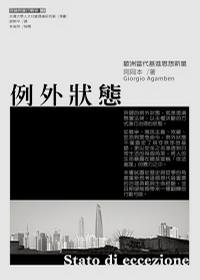
例外狀態
所謂的例外狀態,就是透過懸置法律(憲法),用不受法律限制的措施進行治理的狀態。這彷彿是一個無法的狀態,生命被棄置、驅逐於法律之外,即成為赤裸的生命。 傅柯將自十八世紀起,透過人口學、統計學、公共衛生、都市計畫等新興知識─權力,將人民當作生物性的人口加以計算與調節的一整套治理技術,稱之為「生命政治」。這是人類的生物性生命首度成為政治關注對象的開始。相對於傳統主權「殺生」的死亡權利,這種新的生命權力關注的是養育國家的人口素質。自此政治權力對於人的生命的作用不再僅止於死亡的威嚇,而是全面滲透到整個生命歷程之中。 根據卡爾.施密特的論點:「主權者就是決斷例外狀態之人」,主權者擁有決斷例外狀態的權力,可以隨時撤回對於裸命的政治與法律保護,公民的身分與權利隨時可被棄於無法之境。對於阿岡本而言,生命政治的現代特徵並不如傅柯所說,是將生命納入政治,而是將生命排除在政治之外。相較於傅柯式的「生物生命走入政治」的生命政治提法,阿岡本反過來問,生命如何被政治棄置,而成為赤裸的生命?從這個觀點來看,主權並不直接殺生,而是「放生」,將其逐出人類社群之外,成為裸命。這個問題意識承繼自鄂蘭對難民潮的反思:不被國家承認,喪失公民身分與法律保障的難民,正是僅以其生物上屬性而被歸屬於人類。 阿岡本所強調的是,例外狀態已非例外,而逐漸成為常態,「例外狀態已經成為規則」。現代社會誕生了一群「赤裸人」,指沒有受到政治權利與法律保護的生命狀態,這樣的生命狀態,並非只是被法律排拒在外的少數人所面臨的特殊處境,而是生活在現代國家中的所有人所面對的一般狀況。在常態化的例外狀態中,當代公民的生存模式不是自由主義設定的自主個人,而是納粹集中營裡的猶太人,或是反恐拘留營中的穆斯林,一種赤裸狀態;國家則是恐怖主義的變體,並以訴諸例外狀態來避免失序與維持秩序。 -

Language and Death
A formidable and influential work, Language and Death sheds a highly original light on issues central to Continental philosophy, literary theory, deconstruction, hermeneutics, and speech-act theory. Focusing especially on the incompatible philosophical systems of Hegel and Heidegger within the space of negativity, Giorgio Agamben offers a rigorous reading of numerous philosophical and poetic works to examine how these issues have been traditionally explored. Agamben argues that the human being is not just “speaking” and “mortal” but irreducibly “social” and “ethical.” Giorgio Agamben teaches philosophy at the Collège International de Philosophie in Paris and at the University of Macerata in Italy. He is the author of Means without End (2000), Stanzas (1993), and The Coming Community (1993), all published by the University of Minnesota Press. Karen E. Pinkus is professor of French and Italian at the University of Southern California. Michael Hardt is professor of literature and romance studies at Duke University. -
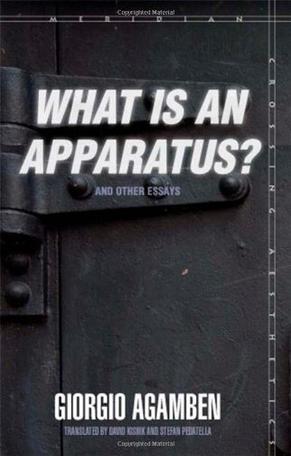
"What Is an Apparatus?" and Other Essays
The three essays collected in this book offer a succinct introduction to Agamben's recent work through an investigation of Foucault's notion of the apparatus, a meditation on the intimate link of philosophy to friendship, and a reflection on contemporariness, or the singular relation one may have to one's own time. "Apparatus" (dispositif in French) is at once a most ubiquitous and nebulous concept in Foucault's later thought. In a text bearing the same name ("What is a dispositif?") Deleuze managed to contribute its mystification, but Agamben's leading essay illuminates the notion: "I will call an apparatus," he writes, "literally anything that has in some way the capacity to capture, orient, determine, intercept, model, control, or secure the gestures, behaviors, opinions, or discourses of living beings." Seen from this perspective, Agamben's work, like Foucault's, may be described as the identification and investigation of apparatuses, together with incessant attempts to find new ways to dismantle them. Though philosophy contains the notion of philos, or friend, in its very name, philosophers tend to be very skeptical about friendship. In his second essay, Agamben tries to dispel this skepticism by showing that at the heart of friendship and philosophy, but also at the core of politics, lies the same experience: the shared sensation of being. Guided by the question, "What does it mean to be contemporary?" Agamben begins the third essay with a reading of Nietzsche's philosophy and Mandelstam's poetry, proceeding from these to an exploration of such diverse fields as fashion, neurophysiology, messianism and astrophysics. -
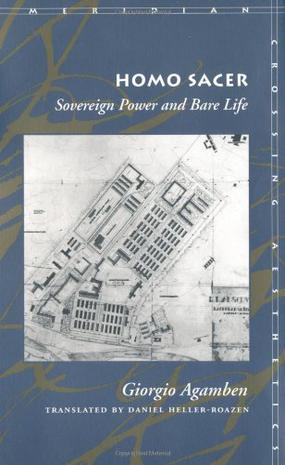
Homo Sacer
The work of Giorgio Agamben, one of Italy's most important and original philosophers, has been based on an uncommon erudition in classical traditions of philosophy and rhetoric, the grammarians of late antiquity, Christian theology, and modern philosophy. Recently, Agamben has begun to direct his thinking to the constitution of the social and to some concrete, ethico-political conclusions concerning the state of society today, and the place of the individual within it. In "Homo Sacer, " Agamben aims to connect the problem of pure possibility, potentiality, and power with the problem of political and social ethics in a context where the latter has lost its previous religious, metaphysical, and cultural grounding. Taking his cue from Foucault's fragmentary analysis of biopolitics, Agamben probes with great breadth, intensity, and acuteness the covert or implicit presence of an idea of biopolitics in the history of traditional political theory. He argues that from the earliest treatises of political theory, notably in Aristotle's notion of man as a political animal, and throughout the history of Western thinking about sovereignty (whether of the king or the state), a notion of sovereignty as power over "life" is implicit. The reason it remains merely implicit has to do, according to Agamben, with the way the sacred, or the idea of sacrality, becomes indissociable from the idea of sovereignty. Drawing upon Carl Schmitt's idea of the sovereign's status as the exception to the rules he safeguards, and on anthropological research that reveals the close interlinking of the sacred and the taboo, Agamben defines the sacred person as one who can be killed and yet not sacrificed--a paradox he sees as operative in the status of the modern individual living in a system that exerts control over the collective "naked life" of all individuals. -
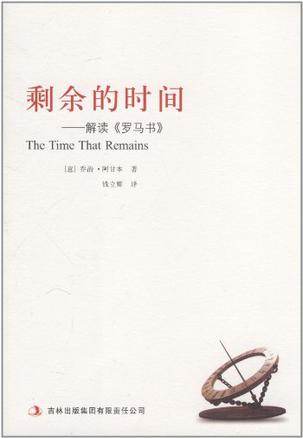
剩余的时间
首部国内正式出版的阿甘本著作 当代最具挑战性的思想家 对最有影响力的圣经书卷的独特解读 搞清楚一个词在历史上每个时期的语义并不简单,特别是像保罗书信这类文本中的词语,它们本身的语义史与整个西方文化的历史完全交融在了一起,与西方文化决定性的中断和延续交融在了一起。 ——阿甘本 《罗马书》对教会影响至钜:奥古斯丁、加尔文、马丁•路德等人都深受它的启示。“耶稣基督的仆人保罗,奉召为使徒,特派传神的福音。”阿甘本——当今欧美学术界的最著名的哲学家之一,在对《罗马书》首句的逐字解读中,试图谨慎地辨明那些经由历代神学探讨、翻译、注释后被强加到原初文本中的东西,将文本重置于早期的犹太弥赛亚主义背景(即“犹太—基督教”背景)下,指出它们是“西方传统中具有奠基性质的弥赛亚主义文本”。 这一对弥赛亚主义的哲学性探究还联系到了另一位重要的思想家——瓦尔特•本雅明。通过仔细解读、对比本雅明的《历史哲学论纲》与保罗书信,阿甘本洞悉到两者间有许多未曾发现的惊人相似之处。